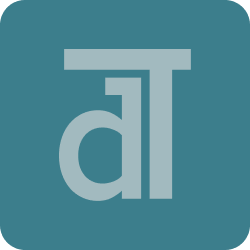mirror of
https://github.com/TxtDot/dalet.git
synced 2025-03-12 21:04:43 +03:00
Markup language ecosystem сombining small file size, big number of possibilities for describing the interface and readability.
| imgs | ||
| specification | ||
| .gitignore | ||
| LICENSE | ||
| README.md | ||
Markup language ecosystem сombining small file size, big number of possibilities for describing the interface and readability.
Warning
Specification is not complete.
Concept
This is Daleth (high level language that translates to Daletl).
# tag: body
# each line is a new tag (if not {}, () is used)
# body text always trimmed
h[1]: TxtDot revolution
p: TxtDot is a cool project
# If no tag is specified, then the 'element' tag, the most primitive tag, is placed
(
Check Dalet too
This is one paragraph
)
This is another paragraph
# [ ] for argument
row[center]: {
link[https://github.com/txtdot/txtdot]: Homepage
btn[https://example.com/donate]: {
# tag without body
img[https://example.com/donate.png]
Donate
}
}
# {} for multiple objects
row: {
{
h[2]: Features
ul: {
Server-side page simplification
Media proxy
Image compression with Sharp
Rendering client-side apps (Vanilla, React, Vue, etc) with webder
Search with SearXNG
Handy API endpoints
No client JavaScript
Some kind of Material Design 3
Customization with plugins, see @txtdot/sdk and @txtdot/plugins
}
}
{
h[2]: Running
{
h[3]: Dev
# () for multiline strings, indent is automatically trimmed
code: (
npm install
npm run dev
)
# (~n Text) n is number of minimum spaces
code[markdown]: (~4
this is codeblock
)
# (# Text) Text after "(# " not modified
code[markdown]: (# this is codeblock)
}
{
h[3]: Production
code: (
npm install
npm run build
npm run start
)
}
{
h[3]: Docker
code: docker compose up -d
}
}
}
# | is delimeter for elements.
# Element | Description == {
# Element
# Description
# }
table: {
Element | Description
h | Heading
p | Paragraph
img | Image
link | Link
btn | Button
ul | Unordered list
br | Line break
}
